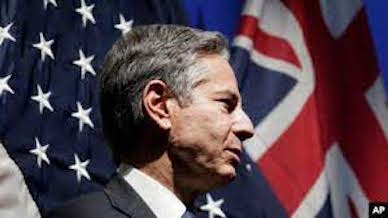The US said on Wednesday that it will start issuing targeted sanctions against people obstructing Somalia’s long-running transition towards democracy and disrupting its parliamentary elections.
The State Department said the punitive measures would start with a travel ban on current and former government officials or anyone wreaking havoc with the delayed election. The State Department did not release the names of the people to be targeted by the travel ban.
US Secretary of State Antony Blinken said on his official Twitter account on Tuesday night that the US was committed to promoting stability in the African country.
“The best path towards sustainable peace in Somalia is through the rapid conclusion of credible elections. The United States has repeatedly expressed concern over the delays and procedural irregularities in Somalia’s electoral process and the broader implications of those irregularities for the country’s democracy and stability,” Mr Blinken said.
Mr Blinken said his country was ready to take the most appropriate steps if the feuding politicians missed the February 25 deadline to hold a transparent vote.
“We are restricting visas for those involved in undermining democracy in Somalia. Obstructing the democratic process has consequences. The U.S. strongly supports the Somali people, and we are committed to working together to advance democracy and mutual prosperity,” said Blinken in statement.
The sanctions will also target those who are pursuing violence against protesters, unjust arrests or intimidation of journalists and opposition members. The immediate family members of such people may also be subject to these restrictions, he added.
The statement came one year after the term of incumbent President Mohamed Abdullahi Farmajo expired.
Somalia has a clan-based electoral system. Though it has a population of 16 million, only 101 elders are chosen by their clans to represent the public in parliament. Those elders then vote to choose a president.
Experts say the unusual arrangement allows corruption.
“Somalia’s voting process is unique in its bizarreness, complexity and lack of representativeness for elections in the 21st century. Not only is electoral suffrage limited and excludes the majority of citizens from participating in a key democratic process, but voters who are involved also do not directly elect members of parliament,” said Amal Hamdan, an electoral systems and legal frameworks expert.
“Not only does this system disenfranchise the majority of the population, it has facilitated vote-buying, allowing ex-warlords and corrupt businessmen to buy parliamentary seats. We can’t really speak of broadly inclusive elections in Somalia since the voting system excludes the majority of the population from voting,” she told The National.
The relationship between the president and the former prime minister has been always tense. In December, the president suspended Prime Minister Mohamed Hussein Roble amid accusations that the latter had interfered with an investigation into a scandal involving army-owned land. Mr Roble denied this and said the charges were a politically motivated attempt to delay the parliamentary vote.
The delay in holding parliamentary elections has highlighted the political tensions in the Horn of Africa country.
The country was set to hold its first democratic election in 50 years in February 2021. But the clan leaders sharply disagreed on how to choose the new president.
President Farmajo extended then his term for two more years, triggering a backlash from several leading politicians and their tribes.
Heavy fighting between government forces and militias mobilised by clans ensued in the capital Mogadishu.
Somalia has been in the grip of civil war for decades. In 1994, the US withdrew its forces from Somalia after 18 American soldiers died following a failed raid against fighters loyal to former warlord Mohamed Farah Aideed. Hundreds of Somalis were also killed in the ensuing battles.
Images and footage of the bodies of US soldiers being dragged through the streets of the capital Mogadishu were broadcast widely.
The US was leading a UN mission to stabilise the famine-stricken country.
The rise of extremist groups such as Al Shabab has made settling the civil conflict difficult.
Al Shabab, which takes its name from the Arabic word for youth, began attracting attention in 2006 after an Ethiopian military intervention at a request from the then transitional government.
The group once held sway over Mogadishu and large portions of the Somali countryside, but in recent years an African Union — led military campaign and US air strikes have pushed it back from major population centres.
But the Somali government and its allies in the region and the West have been locked in a war of attrition for a decade with the extremist Islamist movement, which has also claimed responsibility for several attacks and bombings in neighbouring countries.
Intelligence and counter-terrorism experts have warned that Somalia could become a refugee for terrorist groups to destabilise the region or plot attacks against other countries including the US.
They say that Al Shabab takes advantage of the political instability and conflicts in countries such as Ethiopia and might be working in collaboration with groups with the same terrorist ideology, including Nigeria’s Boko Haram and Al Qaeda franchises in North Africa.
“In recent years, it is the quality of the leadership in Somalia that has really hurt its chances at stability,” Cameron Hudson, a former director for African affairs at the National Security Council at the White House, told The National.
“The international community, led by EU financing and African troops, have made enormous commitments to Somalia only to see it squandered by corrupt and feuding politicians.”
Source: The National






























